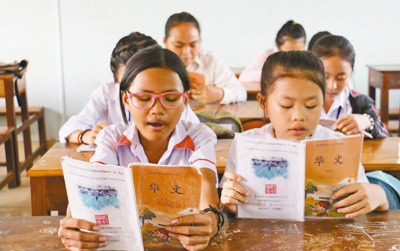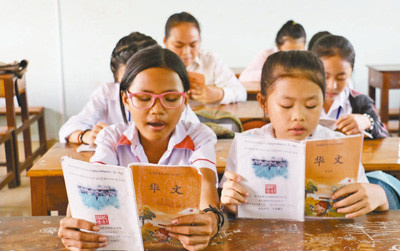By Wang Tian, Jiao Xiang, Yu Jinghao and Zhang Zhiwen from People's Daily

Pic: Cambodian students recite a text of a Chinese book at Chong San Chinese School in Siem Reap. (Photo by Yu Jinghao from People’s Daily)
The warming up of cultural communication and personnel exchanges between China and Cambodia under the framework of the “Belt and Road” initiative, which is evident in the "China fever" and "Chinese fever" sweeping Cambodian cities of Phnom Penh, Sihanoukville and Siem Reap, has benefited more local public.
Signs written in Chinese and Chinese commodities are common in local roadside shops, and even the hotel receptionists can communicate with the customers in fluent Chinese.
In the world-famous scenic site, the Angkor temple ruins, the high demand for Chinese-speaking tour guides has been a direct factor behind the craze for learning Chinese.
Chea Munyrith, Cambodian director of the Confucius Institute at the Royal Academy of Cambodia, told People's Daily that the Confucius Institute has experienced rapid development since 2009 when the then Chinese Vice President Xi Jinping inaugurated the academy.
The institute has established 14 teaching sites from merely 1 at the beginning, covering each province of the country. Currently, a total of more than 10,000 students are learning Chinese at the institute, including over 2,000 government officials, Munyrith added.
"Chinese-teaching has become an important bridge to connect the two peoples, and it has also improved the mutual understanding and friendship between them,” the director said in fluent Chinese.
During the past 150-plus years, many countries around the world have sent professionals and offered funds for the restoration and conservation of the Angkor temple ruins. In 1997, China's State Administration of Cultural Heritage (SACH) entrusted the Chinese Academy of Cultural Heritage (CACH) with the establishment of a preservation team for the ruins.
With the persistence of Chinese experts since then, the restoration of the Chao Say Thevoda and Keo has been finished. Both of the projects will be handed back to Cambodia in 2018.
The staff in charge at the site, Liu Jiang, who is also an associate research librarian of CACH, has been working in Angkor for 10 years. Though far away from his home, he has never regretted his posting since the exquisite temples have been brought back to life by him and his colleagues.
Such hard work has received appreciation from Hang Peou, deputy director general of the Authority of Protection and Management of Angkor and The Region of Siem Reap (APSARA). "The valuable culture of Cambodia has been well protected thanks to China's efforts," he said.
More and more Cambodian people are benefiting from the increasingly frequent cultural and people-to-people exchanges between China and Cambodia.
Hang Peou told People's Daily that a total of 800,000 Chinese tourists visited Cambodia in 2016, ranking the first among all foreign visitors in terms of quantity. They contributed a lot to the development of local industries including hotel, catering and tourism, creating a great number of jobs for local residents.
Now, related departments of Cambodia are launching more measures to attract 2 million Chinese visitors by 2020.
Chinese-speaking tour guides are in such high demand in Siem Reap that their salary could reach as much as $1,000, several times higher than the local average, said Zhang Yong, principal of Chong San Chinese School in Siem Reap.
The school has attracted many students for its Chinese courses, Zhang added.
More and more Chinese businessmen are seeking investment opportunities in Cambodia as well. Valuing the historical and cultural resources of Cambodia, the businessmen at the same time bring capital and technology to the country.
Thanks to the implementation of the "Belt and Road" initiative, the opening of direct flights between China and Cambodia has offered the businessmen a great deal of convenience.
The tourism products themed with Angkor are a highlight of China-Cambodia cultural cooperation, said Zhou Xiaoheng, general manager of a tourism company named Jiaheng, citing historic stage drama "Angkor Empire," a big work completed under the guidance of China's Sichuan government, as an example.
The company, attracted by Angkor's profound culture, hopes to build a world-class tourism product, Zhou added. The drama is the first cultural tourism product of Sichuan within the framework of the "Belt and Road" initiative.
The philosophy of the "Belt and Road" initiative comes from history, said Norodom Arunrasmy, Her Royal Highness Princess of the Kingdom of Cambodia, adding that China and Southeast Asian countries have enjoyed friendly exchanges through the maritime Silk Road since ancient times.
"In addition to silk, porcelains and advanced technologies, Chinese people have brought peace and development to Cambodia and other Southeast Asian countries," the princess noted.
Signs written in Chinese and Chinese commodities are common in local roadside shops, and even the hotel receptionists can communicate with the customers in fluent Chinese.
In the world-famous scenic site, the Angkor temple ruins, the high demand for Chinese-speaking tour guides has been a direct factor behind the craze for learning Chinese.
Chea Munyrith, Cambodian director of the Confucius Institute at the Royal Academy of Cambodia, told People's Daily that the Confucius Institute has experienced rapid development since 2009 when the then Chinese Vice President Xi Jinping inaugurated the academy.
The institute has established 14 teaching sites from merely 1 at the beginning, covering each province of the country. Currently, a total of more than 10,000 students are learning Chinese at the institute, including over 2,000 government officials, Munyrith added.
"Chinese-teaching has become an important bridge to connect the two peoples, and it has also improved the mutual understanding and friendship between them,” the director said in fluent Chinese.
During the past 150-plus years, many countries around the world have sent professionals and offered funds for the restoration and conservation of the Angkor temple ruins. In 1997, China's State Administration of Cultural Heritage (SACH) entrusted the Chinese Academy of Cultural Heritage (CACH) with the establishment of a preservation team for the ruins.
With the persistence of Chinese experts since then, the restoration of the Chao Say Thevoda and Keo has been finished. Both of the projects will be handed back to Cambodia in 2018.
The staff in charge at the site, Liu Jiang, who is also an associate research librarian of CACH, has been working in Angkor for 10 years. Though far away from his home, he has never regretted his posting since the exquisite temples have been brought back to life by him and his colleagues.
Such hard work has received appreciation from Hang Peou, deputy director general of the Authority of Protection and Management of Angkor and The Region of Siem Reap (APSARA). "The valuable culture of Cambodia has been well protected thanks to China's efforts," he said.
More and more Cambodian people are benefiting from the increasingly frequent cultural and people-to-people exchanges between China and Cambodia.
Hang Peou told People's Daily that a total of 800,000 Chinese tourists visited Cambodia in 2016, ranking the first among all foreign visitors in terms of quantity. They contributed a lot to the development of local industries including hotel, catering and tourism, creating a great number of jobs for local residents.
Now, related departments of Cambodia are launching more measures to attract 2 million Chinese visitors by 2020.
Chinese-speaking tour guides are in such high demand in Siem Reap that their salary could reach as much as $1,000, several times higher than the local average, said Zhang Yong, principal of Chong San Chinese School in Siem Reap.
The school has attracted many students for its Chinese courses, Zhang added.
More and more Chinese businessmen are seeking investment opportunities in Cambodia as well. Valuing the historical and cultural resources of Cambodia, the businessmen at the same time bring capital and technology to the country.
Thanks to the implementation of the "Belt and Road" initiative, the opening of direct flights between China and Cambodia has offered the businessmen a great deal of convenience.
The tourism products themed with Angkor are a highlight of China-Cambodia cultural cooperation, said Zhou Xiaoheng, general manager of a tourism company named Jiaheng, citing historic stage drama "Angkor Empire," a big work completed under the guidance of China's Sichuan government, as an example.
The company, attracted by Angkor's profound culture, hopes to build a world-class tourism product, Zhou added. The drama is the first cultural tourism product of Sichuan within the framework of the "Belt and Road" initiative.
The philosophy of the "Belt and Road" initiative comes from history, said Norodom Arunrasmy, Her Royal Highness Princess of the Kingdom of Cambodia, adding that China and Southeast Asian countries have enjoyed friendly exchanges through the maritime Silk Road since ancient times.
"In addition to silk, porcelains and advanced technologies, Chinese people have brought peace and development to Cambodia and other Southeast Asian countries," the princess noted.
 Menu
Menu
 China, Cambodia enjoy deeply rooted, vibrant friendship
China, Cambodia enjoy deeply rooted, vibrant friendship
















